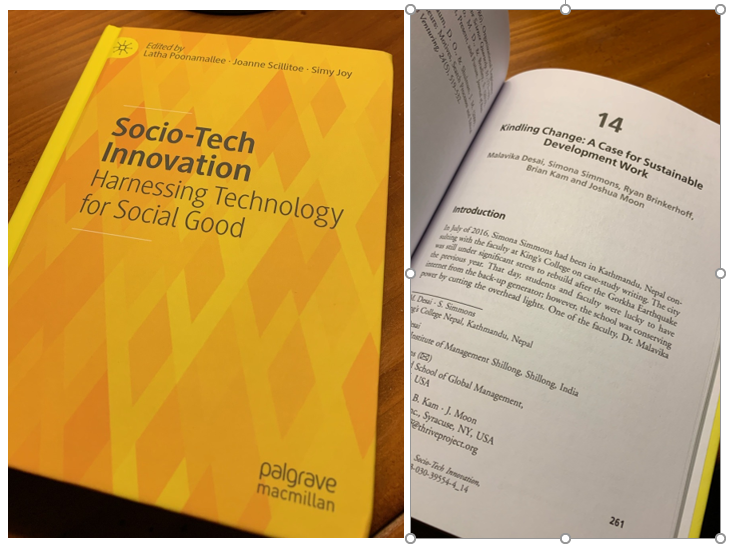
The work of LaunchPad venture Thrive Projects, founded by Brian Kam ’16 (Whitman), Ryan Brinkerhoff ’16 (Maxwell) and Joshua Moon ’16 (Arts and Sciences) is featured in a new academic book, “Socio-Tech Innovation: Harnessing Technology for Social Good,” published by Palgrave MacMillan.
The book explores novel solutions that involve development or adoption of technological innovations to address social and/or environmental problems with a view towards creating benefit for the larger whole rather than just for owners or investors. The chapters outline meaningful actionable insights that can help social ventures scale up successfully, and address issues of underserved markets. It is written for researchers in innovation and entrepreneurship programs, providing a unique and interdisciplinary approach to studying social innovation that is grounded in technology innovation.
Thrive Projects is one of a series of socio-tech venture cases that illustrate these dynamics and can be used in undergraduate and graduate courses. The chapter on the Syracuse University student venture was co-written by Malavika Desai, Simona Simmons, Ryan Brinkerhoff, Brian Kam and Joshua Moon.
An abstract in Springer.com describes the chapter case study,
“Kindling Change: A Case for Sustainable Development Work.”
“In 2015, the Gorkha Earthquake struck Nepal, killing more than 8000 people and displacing an additional two million in one of the worst natural disasters of the decade. The world responded by sending billions of dollars in aid to an already underdeveloped nation, along with thousands of relief workers and volunteers. One of those volunteers would be the Co-Founder of Thrive Projects. Fast-forward one year and Thrive Project founders returned to Nepal with a mission to bring power to communities still struggling to rebuild using their product Solar-Powered Auxiliary Relief Kiosks. They would come to realize that for many communities, power and supplies were not enough to address the root cause of the lagging development in Nepal. The firm continued to evolve with the vision to address this cause. By the end of 2016, Thrive had implemented numerous projects within the state of Kathmandu, and achieved rapid growth in its labor force. Although the socio-tech venture was achieving its vision, Thrive Founders strived to make the venture financially self-sustaining. This case examines how these factors, and market conditions, influenced their business and speculation on the future as they embark upon their second year in business.”
Dr. Desai and Simmons, academic researchers for the project, authored the chapter on Thrive. They recall meeting Kam and Brinkerhoff over tea in Nepal, calling them, a “cross between Indiana Jones and models from a Guess Jeans ad.” They were immediately impressed with their mission to have a lasting impact on the lives of the people of Nepal recovering from the Gorka Earthquake. From that conversation over tea grew a two-year collaboration to produce this case study which is part of the book.
Thrive Projects was one of the first ventures started in the LaunchPad, winning first place in the social impact category of the New York Business Plan Competition in 2017. Kam, Brinkerhoff and Moon have remained active members and mentors.
Read more about their journey in a special feature story appearing next week in “Startup Thinking.”